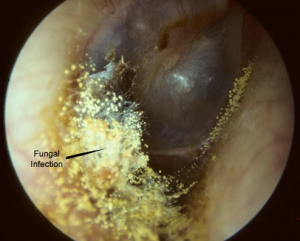
By: Megan Evans
What causes Swimmer’s ear?
Swimmer’s ear (otitis externa) is inflammation caused by water or other substances entering the ear canal. Debris and water interferes with the lipid layer, a protective coating of the ear. Once the lipid layer is irritated, infection may occur. It is important not to scratch inside your ear because the lipid layer protects the skin, assists in cleaning and lubrication, and also provides some protection from bacteria, fungi, insects and water.
For instance, ear wax (cerumen) is known to reduce the viability of a wide range of bacteria, including Haemophilus influenzae, Staphylococcus aureus, and many variants of Escherichia coli, sometimes by as much as 99%. If you already have swimmer’s ear, avoid getting water in your ear for 5-7 days or until your symptoms clear.
How to prevent Swimmer’s ear:
- Wear earplugs or a silicone ear cap when swimming and when showering.
- Avoid getting any type of debris in your ear. Debris such as soap and shampoo may also cause irritation.
- If your ears are sensitive, opt for external head phones so that you don’t irritate your ear canal.
- Impacted ear canals can also increase your chance of getting an ear infection.
- Do not put any sharp objects in your ear and avoid using a Q-tip. Instead, opt for over-the-counter ear cleaning kits or an ear wax vacuum.
How to clean your ear:
Tilt your head to the side and insert a few drops of rubbing alcohol, which will absorb excess water and kill bacteria and fungi. Hold your head to the side for several minutes so that the rubbing alcohol can thoroughly clean your ear. If rubbing alcohol is too harsh, try a 50:50 mixture with white vinegar. Acetic acid, an organic compound found in vinegar, will also kill bacteria and fungi.
Caution: Consult your doctor prior to using this mixture if you have had ear surgery, an ear infection, or a perforated, ruptured, or punctured eardrum.
